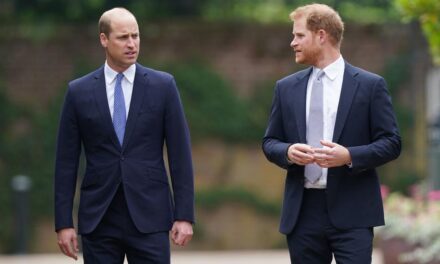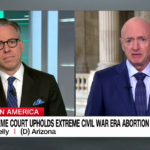
Zelensky Says Military Aid Could Free Up Exports, Easing Food Prices
![]()
President Volodymyr Zelensky pressed his allies for even more military aid on Saturday after the United States signed one of its biggest war packages in decades, arguing that winning the fight against Russia would also help tame rising global food costs.
Hours after Mr. Biden signed one of the largest foreign assistance efforts in at least 20 years, Mr. Zelensky emphasized the international reverberations of the conflict, from energy markets to food prices. The weapons would allow Ukraine to open ports and transport routes shut off by Russia, freeing Ukrainian exports of grain and other food supplies.
Inflation has quickened to the highest in decades across the world, fueling concerns about a possible recession. Mr. Zelensky, who has been persistent in calling for more international help for Ukraine’s fight, argued that food prices would ease if it could break Russia’s grip on its ports.
“You can unblock them in different ways,” Mr. Zelensky said. “One of the ways is a military solution. That is why we turn to our partners with inquiries regarding the relevant weapons.”
Aid from the United States for Ukraine’s fight against the Russian invasion now totals about $54 billion. The latest package includes the transfer of $11 billion in weapons and other military supplies, $6 billion for the support of Ukraine’s military, $8.8 billion to help the economies of Ukraine and other countries affected by the war and $4.3 billion for refugee assistance.
Here are some other major developments:
-
Mr. Biden and the actor Morgan Freeman are among the 963 Americans on a list of people Russia says will be barred for life from entering the country, a move Russia’s Foreign Ministry described as retaliation against the hostility of the United States.
-
International measures targeting the Russian economy have “practically broken” logistics in the country, its transport minister said on Saturday, a rare acknowledgment by the Kremlin minister of the impact of sanctions.
-
The State Department said that a U.S. consular officer had visited Brittney Griner, the W.N.B.A. star being detained in Russia, and found her “as well as could be expected under these exceedingly challenging circumstances.”
-
The leaders of Sweden and Finland held separate phone calls on Saturday with President Recep Tayyip Erdogan of Turkey, who has said he opposes the applications of the two Nordic countries to join NATO.

May 22, 2022, 3:11 a.m. ET
May 22, 2022, 3:11 a.m. ET
Austin Ramzy
Reporting from Hong Kong
President Andrzej Duda of Poland traveled to Kyiv on Sunday and plans to address Ukraine’s parliament, the first such speech by a foreign head of state since the Russian invasion began in February, his office said. Mr. Duda previously visited Ukraine in April.
![]()
May 21, 2022, 7:48 p.m. ET
May 21, 2022, 7:48 p.m. ET
Juston Jones
President Volodymyr Zelensky used the prospect of a global food crisis to appeal for weapons. Russia’s blockade of grain shipments “will create a food crisis if we do not unblock the routes for Ukraine,” he said. One of the ways to unblock them is a military solution, he said.
![]()
May 21, 2022, 5:00 p.m. ET
May 21, 2022, 5:00 p.m. ET
Image
President Biden on Saturday signed a new $40 billion package of military and humanitarian aid for Ukraine as the country braced for a drawn-out war of attrition in its eastern regions, vowing that it would not stop fighting until all Russian forces were expelled.
Yet on Saturday, President Volodymyr Zelensky of Ukraine acknowledged that ultimately the conflict would require a diplomatic solution, raising questions about exactly what that would mean.
Mr. Zelensky said that Russia had thwarted an initial attempt to end the war through dialogue and that now the conflict was “very difficult.” Speaking on the third anniversary of his inauguration as president, he said that the war “will be bloody” but “the end will definitely be in diplomacy.”
Despite a recent string of setbacks and a shortage of manpower and equipment, Russia pressed ahead with its military campaign in eastern Ukraine, and with its propaganda offensive at home, hours after claiming to have achieved complete control of the port city of Mariupol, in what would be its most significant gain since the war started.
Russia said in a statement late Friday that its defense minister, Sergei K. Shoigu, had informed President Vladimir V. Putin of the “complete liberation” of the Mariupol steel plant where Ukrainian fighters had made their last stand in the city before surrendering in recent days. Ukrainian officials have not confirmed the Russian claim.
Image
The Ukrainian military, for its part, said that in the past day it had repulsed 11 attacks in the provinces of Donetsk and Luhansk, collectively known as the Donbas region, and had destroyed eight tanks as well as other Russian combat vehicles.
Overall, Mr. Zelensky asserted, Ukraine has “broken the backbone of the largest, or one of the strongest, armies in the world.”
The war is now set to enter its fourth month, and while Moscow has been forced to retreat first from outside the capital, Kyiv, and more recently from the country’s second-largest city, Kharkiv, neither side is currently making more than incremental gains.
With the conflict coming ever closer to a stalemate and both sides fighting in the Donbas region to gain the upper hand, calls for a cease-fire have grown louder, along with questions about what would constitute victory, or at least a suitable outcome, for Ukraine.
“A cease-fire must be achieved as soon as possible,” the Italian prime minister, Mario Draghi, urged on Thursday, opening a parliamentary debate on Italy’s role in backing Ukraine. He added that “we have to bring Moscow to the negotiating table.”
German, French and Italian suggestions of a cease-fire have been rejected angrily and even bitterly by Kyiv as selfish and poorly timed. Ukrainian officials say that Russia is hardly ready for serious peace talks and that their forces — despite considerable losses in the Donbas and in Mariupol — have the momentum in the war.
For now, some in Ukraine are insisting that the only outcome it will abide is the restoration of all territory lost to Russia since 1991, when it gained independence from the Soviet Union. That would include both the Donbas in its entirety and Crimea, which Russia annexed in 2014. But Mr. Zelensky has hinted that he would accept the status quo ante before the war.
Image
Western diplomats maintain that this is a matter for Ukraine to decide. But their unanimity begins to break down when it turns to specifics.
On Friday, the U.S. ambassador to NATO, Julianne Smith, speaking at a conference in Warsaw, restated the United States’ firm support of Ukraine. “In terms of the end state,” she added, “we believe we will see Ukraine prevail, and we want them to protect their territorial integrity and their sovereignty.”
But she added another objective: “We want to see a strategic defeat of Russia. We want to see Russia leave Ukraine.”
For Eastern European and Baltic leaders, a durable peace settlement and an end to the conflict has to include a crushing military victory that spells an end to Mr. Putin’s presidency. Anything short of his departure would merely pave the way for the next war, they say. They balk at suggestions from Berlin, Paris and Rome to lure Mr. Putin back to the negotiating table.
“Peace can’t be the ultimate goal,” Prime Minister Kaja Kallas of Estonia recently told The New York Times. “I only see a solution as a military victory that could end this once and for all, and also punishing the aggressor for what he has done.”
Otherwise, she said, “we go back to where we started — you will have a pause of one year, two years, and then everything will continue.”
“All these events should wake us from our geopolitical slumber, and cause us to cast off our delusions,” Prime Minister Mateusz Morawiecki of Poland said on Thursday at the Warsaw conference. “I hear there are attempts to allow Putin to somehow save face in the international arena. But how can you save something that has been utterly disfigured?”
Image
“Russia can only be deterred by our unity, military capabilities and hard sanctions,” he added. “Not by phone calls and conversations with Putin.”
In a diplomatic salvo of its own, Russia’s Foreign Ministry on Saturday released a list of 963 people who would be barred for life from entering Russia, among them Mr. Biden, the actor Morgan Freeman and the New York Times columnist Bret Stephens. The ministry described its move as “necessary” retaliation against the “hostile actions” of the United States.
Against the backdrop of an unfolding debate about what a final settlement might look like, Russian and Ukrainian forces dug in on the battlefield, conscious that every military victory would turn into a diplomatic advantage.
The Ukrainian military said on Saturday that Russia was demining the port of Mariupol in an attempt to get it running again. Reopening the port would tighten Moscow’s control over the parts of southern and eastern Ukraine that it controls, as well as increase its economic leverage over the Black Sea, where its navy is dominant.
And Russian forces have become entrenched in areas outside of the city of Kharkiv, presenting a formidable obstacle to any Ukrainian efforts to press their advantage in that area.
Russia’s military prepared on Saturday to attempt another pontoon crossing of an eastern Ukrainian river that has posed a formidable barrier to its aims in the region, Ukraine’s military said, despite suffering one of its single most lethal engagements of the war in a previous attempt this month.
Russian forces were staging bridging equipment again near the Seversky Donets River, the Ukrainian military said in its regularly published morning assessment of the war. The stream’s winding path cuts through the heart of the region where Russian forces are battling Ukrainian defenders — around the cities of Izium, Sloviansk, Kramatorsk and Sievierodonetsk — creating major obstacles to Moscow’s offensive in eastern Ukraine.
Image
“The enemy has not ceased offensive actions in the eastern operation zone with the goal of establishing full control over the territory of the Donetsk and Luhansk regions,” the assessment said.
Ukraine’s military has blown up bridges to force the Russians to build pontoon bridges, a tactic that has proved effective — and costly for the Russian army. Military forces are particularly vulnerable to artillery strikes as they congregate soldiers, armored vehicles and equipment while attempting a crossing.
In the battle for control of the Donbas region, Russian forces have attempted several pontoon crossings of the Seversky Donets, seen as an important tactical step toward the goal of surrounding a pocket of Ukrainian troops in and around the city of Sievierodonetsk.
On May 11, Ukrainian artillery struck a pontoon crossing with devastating effect, destroying the bridge, incinerating armored vehicles on both river banks and killing more than 400 soldiers, according to estimates by Western military analysts. The British Defense Ministry has issued statements corroborating the Ukrainian accounts, based on satellite imagery and aerial drone imagery posted online of the strike.
Whatever the ultimate outcome of the war, no one expects it to end soon, as each country’s leader needs to be able to claim some sort of victory, particularly Mr. Zelensky.
“For Zelensky, there is no other path forward than to continue to fight and reconquer the territory they lost,” said Andrew A. Michta, a German-based foreign policy and defense analyst. “The minute he agrees to any compromise, given the blood paid, he loses political credibility. The Ukrainians can’t cut a deal just to stop the fighting, so this will be a long, drawn-out war.”
Steven Erlanger reported from Warsaw, Andrew E. Kramer from Dnipro, Ukraine, and Katrin Bennhold from Berlin. Anton Troianovski contributed reporting from Istanbul.
![]()
May 21, 2022, 3:46 p.m. ET
May 21, 2022, 3:46 p.m. ET
Image
Russia’s transport minister said on Saturday that international measures intended to cripple the Russian economy have “practically broken” logistics in the country, the state news agency Tass reported, in a rare acknowledgment by a Kremlin minister of the damage sanctions are doing.
In the three months since Russia invaded Ukraine, the United States, the European Union and other nations have imposed a variety of severe punishments on Russia and her businesses, including closing airspace to Russian planes and cutting off banks from Western markets.
“Those sanctions that are presently imposed on the Russian Federation have practically broken all logistics in our country,” the minister, Vitaly Savelyev, said as he visited the city of Astrakhan in southern Russia.
Mr. Savelyev said that Russian officials had been forced “to look for new logistical corridors” for moving goods, including a north-south route that would pass through Astrakhan and two ports on the Caspian Sea, Olya and Makhachkala.
Hundreds of private companies also have curtailed their business in Russia or have withdrawn from the country entirely.
The Kremlin has stifled coverage of the war, including blocking access to Facebook and major foreign news outlets, making it difficult for analysts outside the country to gauge how Western sanctions are affecting Russia.
President Vladimir V. Putin has insisted that Russia’s economy is weathering the measures, but signs of the trouble have emerged, among them shoppers complaining about rising prices, banks making receipts shorter in response to a paper shortage, and clothing manufacturers running out of buttons.
The Russian Central Bank has acknowledged that consumer demand and lending are on a downhill slide and that “businesses are experiencing considerable difficulties in production and logistics.” And in April, Elvira Nabiullina, the leader of the central bank, gave Russian lawmakers a far-reaching, negative assessment of sanctions, noting that “practically every product” manufactured in Russia relies on imported components.
“At the moment, perhaps this problem is not yet so strongly felt, because there are still reserves in the economy, but we see that sanctions are being tightened almost every day,” she said. “The period during which the economy can live on reserves is finite.”
Since access to European markets has been sharply reduced since the war began, Russian officials have increasingly looked to Asia for business. In its article on Mr. Savelyev’s remarks on Saturday, Tass reported that the north-south corridor he described connects Russia, “in particular,” with Azerbaijan, Iran and India.

May 21, 2022, 2:12 p.m. ET
May 21, 2022, 2:12 p.m. ET

March bill
May bill
$13.6 billion
$40.1 billion
Traditional foreign aid
Economic Support Fund
$0.6
$8.8
Food assistance, health care and other aid
$2.7
$4.3
Military and security assistance
$0.0
$6.0
Grants and loans for military supplies
$0.7
$4.0
Migration and refugee assistance
$1.4
$0.4
Asst. for Europe, Eurasia and Central Asia
$1.1
$0.0
Other foreign aid
$0.3
$1.2
Other military
U.S. military deployments and intelligence
$3.0
$5.1
Weapons and other supplies
$3.5
$9.1
Other
Administration for Children and Families
$0.0
$0.9
Diplomatic programs and other
$0.2
$0.4
Enforcing sanctions
$0.1
$0.1

March bill
May bill
$13.6 bil.
$40.1 bil.
$0.6
$8.8
Food assistance,
health and other aid
$2.7
$4.3
Military and security
assistance
$0.0
$6.0
Grants and loans for
military supplies
$0.7
$4.0
Migration and refugee
assistance
$1.4
$0.4
Asst. for Europe,
Eurasia & Central Asia
$1.1
$0.0
Other foreign aid
$0.3
$1.2
Other military
U.S. military deploy-
ments & intelligence
$3.0
$5.1
Weapons and other
supplies
$3.5
$9.1
Other
Administration for
Children and Families
$0.0
$0.9
Diplomatic programs
and other
$0.2
$0.4
Enforcing sanctions
$0.1
$0.1
Source: Ukraine Supplemental Appropriations Act, 2022; Additional Ukraine Supplemental Appropriations Act, 2022 (discretionary funding)
The $40 billion package of new aid for Ukraine, approved by Congress earlier this week and signed by President Biden on Saturday, brings the total that the United States has pledged toward countering Russia’s invasion to roughly $54 billion, when combined with a smaller package passed in March.
The money in the newly enacted package is nearly evenly divided between military and humanitarian aid.
It includes $8.8 billion for a fund to shore up the economies of Ukraine and other countries affected by the war. Those funds can be used to provide direct support to Ukraine’s government, though they are subject to some safeguards and oversight.
The bill also includes about $4.3 billion to provide urgent support, health services and food assistance to Ukrainian refugees.
Additionally, it provides about $6 billion for support, weapons and training for Ukraine’s military and national security forces, and $4 billion in grants and loans for military supplies.
It authorizes the transfer of $11 billion in American weapons and other military supplies and sets aside $5.1 billion for U.S. military deployments and intelligence. It also earmarks $9 billion in new spending to replace the military equipment sent to Ukraine from American stockpiles.
There are smaller sums in the aid package that will go to domestic U.S. agencies: $100 million for the enforcement of sanctions and export controls against Russia, $400 million for diplomatic programs, and $900 million for the federal Administration for Children and Families to support Ukrainian refugees.

May 21, 2022, 1:06 p.m. ET
May 21, 2022, 1:06 p.m. ET
Image
Image
Image
Ukraine’s National Opera reopened Saturday afternoon, with caviar, sparkling wine and the conviction that, even as Russia’s military makes advances in the country’s east, returning to aspects of life as normal is an act of defiance.
Men and women in military uniforms joined an elegant crowd for “The Barber of Seville,” the comedic opera by the Italian composer Gioachino Rossini about a caper to capture the heart of a beautiful young woman, Rosina.
“Performing in this show felt like coming back to life,” said Olga Fomichova, a soprano who sang the part of Rosina, as she clutched a bouquet of white roses after the performance. “It was like my first performance all over again.”
Saturday’s show was sold out. The National Opera has more than 1,300 seats, but could sell only 300 tickets, the number of people who can fit in the coat check, which doubles as a bomb shelter. The upper levels of the opera, and their elite boxes, sat empty.
Air raid sirens wailed several times before the afternoon performance, but were quiet for the duration of the show.
Image
Image
Kyiv was effectively surrounded by Russian soldiers until early April, when they retreated, revealing the extent of atrocities in towns and villages they occupied. Restaurants and stores have slowly reopened in recent weeks. And now, residents say, it is time to return to the theater.
“It is a symbol that Kyiv, which was surrounded — and surrounded by killing fields — has reopened its cultural institutions,” said Lt. Maksym Butkevych, an audience member who came for the day from his military barracks. “It is a kind of promise that we will prevail. Life will go on, not death.”
Some men in army fatigues chuckled when two of the main characters began jousting with light sabers in the second act. While a philharmonic festival opened on Friday in the western city of Lviv with a mourning requiem, Anatoly Solovyanenko, the Opera’s artistic director, said the wartime season at the National Opera would avoid heavy productions.
“People have enough drama in their lives every single day,” Mr. Solovyanenko said.
Yulia Solovyenko, a 24-year-old audience member, said the production was “a message to the rest of the world that we did not give up.” Ms. Solovyenko said she had fled Ukraine to nearby Moldova during the most brutal fighting around Kyiv, and had dreamed of “wearing a beautiful dress, putting on makeup and feeling good.”
Many people wore cocktail dresses and sipped from glass flutes the sweet sparkling wine popular in this region. As the crowd delivered a minutes-long standing ovation, outside the theater, Russians were taking control of the Azovstal steel plant in the decimated city of Mariupol.
Lieutenant Butkevych said that in spite of what was happening elsewhere in the country, it was right for the residents of Kyiv to gather and celebrate.
“It is important not to forget that this is what we are fighting for,” Lieutenant Butkevych said. “We want people to celebrate when they feel like celebrating. We did not fight for mourning and tragedies.”

May 21, 2022, 12:06 p.m. ET
May 21, 2022, 12:06 p.m. ET
Cassandra Vinograd
The prime minister of Portugal, António Costa, said his country has agreed to give 250 million euros (nearly $264 million) in financial assistance to Ukraine. The announcement came after he met with President Volodymr Zelensky and Prime Minister Denys Shmyhal in Ukraine’s capital, Kyiv, and visited a nearyby suburb devastated by fighting.

May 21, 2022, 11:31 a.m. ET
May 21, 2022, 11:31 a.m. ET
Image
The leaders of Sweden and Finland held separate phone conversations on Saturday with President Recep Tayyip Erdogan of Turkey, who has said he opposes the applications of the two Nordic countries to join NATO.
Russia’s invasion of Ukraine prompted the governments of Finland and Sweden to seek NATO membership, overturning policies of military neutrality that had endured for decades. NATO accession requires agreement from each of the alliance’s 30 members, which gives Turkey unusual leverage.
Mr. Erdogan has expressed objections that could slow the process and require negotiations to address its concerns. In particular, he has argued that Sweden offers tacit support to Kurdish separatists who oppose the government in Ankara and whom he regards as terrorists. Efforts by diplomats from Washington and elsewhere in the alliance to encourage him to soften that position have not been successful.
Jens Stoltenberg, the NATO secretary general, said he stressed the importance of the two countries’ applications in a talk with Mr. Erdogan on Saturday. “We agree that the security concerns of all allies must be taken into account and talks need to continue to find a solution,” he said.
Prime Minister Magdalena Andersson of Sweden said Saturday that she appreciated her talk with Mr. Erdogan on her country’s application to join NATO, but gave no details on the content of the call.
“We look forward to strengthening our bilateral relations, including on peace, security, and the fight against terrorism,” she said on Twitter.
President Sauli Niinisto of Finland said he had an “open and direct” conversation with Mr. Erdogan on Saturday. “I stated that as NATO allies, Finland and Turkey will commit to each other’s security and our relationship will thus grow stronger. Finland condemns terrorism in all its forms and manifestations,” he said on Twitter.
The calls came a day after Prime Minister Boris Johnson of Britain spoke with Mr. Erdogan and encouraged him to work with Sweden and Finland to address his concerns before a summit in Madrid next month.
Source: https://www.nytimes.com/live/2022/05/22/world/russia-ukraine-war
















